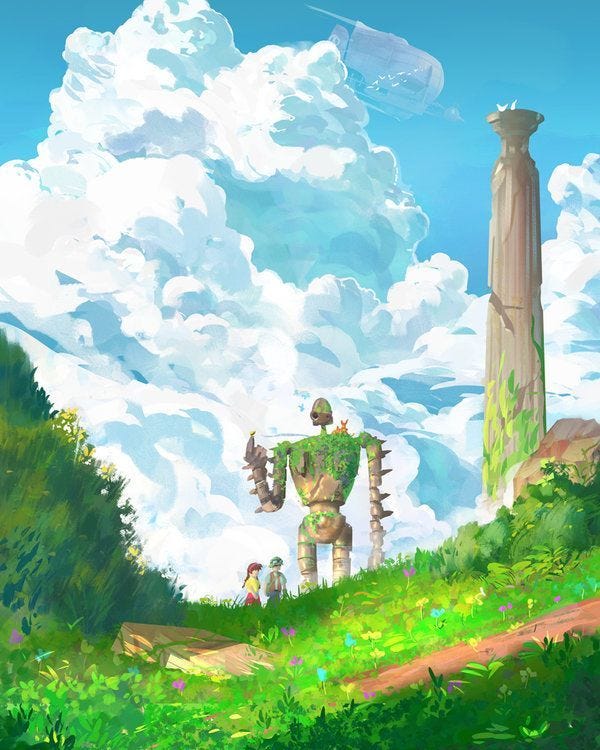Once upon a time, the Empire (Of Progress) loved towers.
Not the kind of towers that poets praised, nor the spires that once pointed to heaven, but towers of glass and steel whose only purpose was to reach upward—away from the earth and everything on it. The Empire was fascinated with speed and spectacle, addicted to the kind of progress that moved forward without ever stopping to ask, "Forward to where?"
Yet all empires eventually tire. Towers built for the sake of height alone inevitably crumble. And crumble they did, not dramatically at first—but quietly, the way most grand mistakes do, collapsing beneath their own weight, their own haste, their own profound forgetfulness.
But after the towers fell, we found we had something worth building again: gardens.
It began simply enough. Someone planted a few seeds in the cracks of old highways. Vines climbed gently over billboards no longer screaming advertisements. Robots, freed from the chains of endless productivity, were reprogrammed to till fields, prune apple trees, and carry baskets rather than guns. Children learned to recognize birdsong again, and instead of tablet screens, their fingers knew the texture of soil and seeds.
Technology hadn't disappeared—it had simply remembered its place. Chesterton once wisely remarked that the problem wasn't that machines existed; it was that men worshipped them. But in the gardens after the empire, technology no longer demanded worship. Instead, it bowed humbly, serving humans by tending flowers, orchards, and memories. Robots learned the liturgies of planting and pruning, working alongside farmers, not above them.
A quiet miracle happened. The Empire had chased after dreams of utopia, only to wake in nightmares. But gardens don't promise utopia—they promise work, patience, seasons, and humility. The windmills turned slowly, converting the gentle breath of the world into power, enough to sustain but never to dominate. Everything became slower, quieter, and filled with intention.
Here, progress meant apples ripening in their season, bread baking slowly in hearth fires, and communities gathered not around screens but around real tables. It meant robots programmed not for maximum efficiency, but for maximum reverence, their algorithms now including silence, patience, and carefulness.
Miyazaki dreamed of worlds like this—where machines walked gently upon the earth, and human hands, though calloused from labour, remained soft enough to hold children's dreams. This was the real solarpunk: not sterile futurism but lush green fields; not sterile minimalism but warmly cluttered cottages, each chair, book, and tool lovingly worn.
We didn't abandon technology; we remembered it. We remembered that anything built by human hands must serve human souls. Tools became allies again, no longer masters, and certainly not gods.
We found our future, not by endlessly reaching upward, but by kneeling downward to plant, to tend, and to bless. We learned again how to measure progress by how well we lived together, how reverently we walked upon the earth, and how beautifully we cultivated the ordinary.
In these gardens after the empire, we found no utopia—only home. And home was enough.



“ Oh Adam was a gardener
and God who made him sees
That half a proper gardener’s work
Is done upon his knees.”
Rudyard Kipling